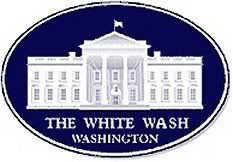Tidbits From The Brady Briefing Room
 Normally the James S. Brady Briefing Room in the White House is the private domain for Scott “The Lyin’ King” McClellan’s daily fibathon… But this week offered an additional treat, with George W. Bush holding one of his rare press conferences there.
Normally the James S. Brady Briefing Room in the White House is the private domain for Scott “The Lyin’ King” McClellan’s daily fibathon… But this week offered an additional treat, with George W. Bush holding one of his rare press conferences there.Let’s have a look at what the inimitable Helen Thomas, one of the few reporters with the nerve to seriously challenge Bush, asked:
Thomas: I'd like to ask you, Mr. President, your decision to invade Iraq has caused the deaths of thousands of Americans and Iraqis, wounds of Americans and Iraqis for a lifetime. Every reason given, publicly at least, has turned out not to be true. My question is, why did you really want to go to war? From the moment you stepped into the White House, from your Cabinet -- your Cabinet officers, intelligence people, and so forth -- what was your real reason? You have said it wasn't oil -- quest for oil, it hasn't been Israel, or anything else. What was it?
Bush: I think your premise -- in all due respect to your question and to you as a lifelong journalist -- is that -- I didn't want war. To assume I wanted war is just flat wrong, Helen, in all due respect --A couple of notes on that little exchange in which, as is often the case, what Bush didn’t say is more illuminating than what did come out of his mouth.
Thomas: Everything --
Bush: Hold on for a second, please.
Thomas: -- everything I've heard --
Bush: Excuse me, excuse me. No President wants war. Everything you may have heard is that, but it's just simply not true. My attitude about the defense of this country changed on September the 11th. We -- when we got attacked, I vowed then and there to use every asset at my disposal to protect the American people. Our foreign policy changed on that day, Helen. You know, we used to think we were secure because of oceans and previous diplomacy. But we realized on September the 11th, 2001, that killers could destroy innocent life. And I'm never going to forget it. And I'm never going to forget the vow I made to the American people that we will do everything in our power to protect our people.
Part of that meant to make sure that we didn't allow people to provide safe haven to an enemy. And that's why I went into Iraq -- hold on for a second --
Thomas: They didn't do anything to you, or to our country.
Bush: Look -- excuse me for a second, please. Excuse me for a second. They did. The Taliban provided safe haven for al Qaeda. That's where al Qaeda trained --
Thomas: I'm talking about Iraq --
Bush: Helen, excuse me. That's where -- Afghanistan provided safe haven for al Qaeda. That's where they trained. That's where they plotted. That's where they planned the attacks that killed thousands of innocent Americans.
I also saw a threat in Iraq. I was hoping to solve this problem diplomatically. That's why I went to the Security Council; that's why it was important to pass 1441, which was unanimously passed. And the world said, disarm, disclose, or face serious consequences --
Thomas: They didn’t say go to war --
Bush: -- and therefore, we worked with the world, we worked to make sure that Saddam Hussein heard the message of the world. And when he chose to deny inspectors, when he chose not to disclose, then I had the difficult decision to make to remove him. And we did, and the world is safer for it.
- Thomas was fundamentally asking how he justifies the enormous human cost of this war given that every reason he has provided has turned out to be false. He never responds to that.
- His only response to Thomas asserting that Iraq “…didn't do anything to you, or to our country…” is for him to avoid answering about Iraq and instead going back to the Taliban and al Qaeda, which had nothing to do with Saddam Hussein or Iraq.
- The biggest whopper was for Bush to say “we worked with the world” before invading Iraq. That must explain why much of the world now hates America for this war.
Given non-responses like that, the White House press must have been practically spewing soda through their noses when Scotty McClellan answered this way when asked yesterday how he believes the president is doing with his question-answer sessions lately.
“I mean, he recognizes that one of his most important responsibilities as Commander-in-Chief is to keep the American people informed when we are at war. And that means playing the role as Educator-in-Chief, as he has talked about over the last few days. So it's important for the President to directly engage the American people and talk to them about our strategy for victory, and talk to them about why he is optimistic about how things are going.”Educator-in-Chief?
Now that’s funny. Come to think of it, I would like to know how The Pet Goat ends.

















<< Home